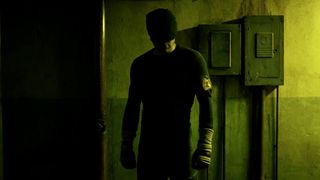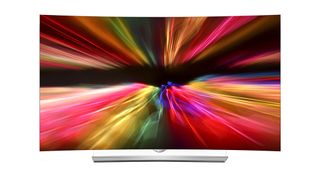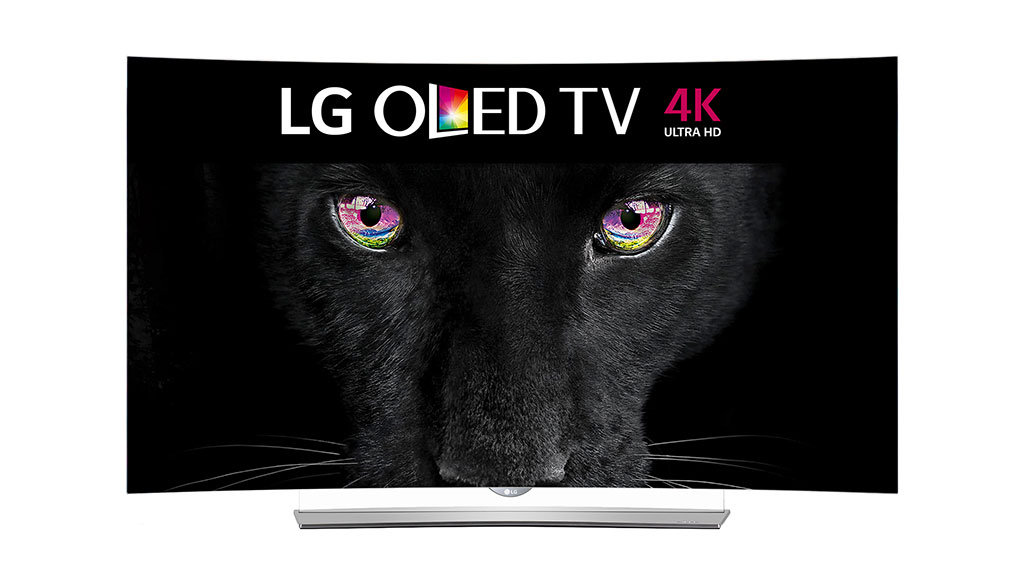Why you can trust TechRadar
Performance
It's been said that Marvel's Daredevil series on Netflix was shot in a way that could only be viewed as originally envisioned on a 4K OLED TV. The series' director of photography, Matt Lloyd, has stated that his creative team shot scenes that were "irresponsibly dark", and that he was able to film things differently because of OLED screens.
Naturally, we took this as an opportunity to go straight to the show-stopping, single-shot hallway fight scene from the second episode of Daredevil, booted up in the EG960T's Cinema mode, as recommended by TV's accompanying paperwork, and, in this case, the show's cinematographer.
Immediately, the scene's dank and dingy hallway is rendered with complete clarity, with dark areas and shadows disappearing gradually into complete blackness.
Daredevil walks into the frame, dressed head-to-toe in black, his dark-side appearing like a silhouette against a grimy green and (off)white wall. Meanwhile, the light on his back gives a good indication of how naturally the pixels fade from light to dark.
This is due to LG's 10-bit colour depth, producing over a billion colours and providing spectacular shading that eliminates that weird wavy effect that sometimes emanates from light sources on LED/LCD televisions.

As mentioned earlier, clarity is absolutely exceptional. Watching the show in its native 4K resolution (thanks to the TV's Netflix app), there was not a single instance of aliasing present.
Picture quality is to die for – bright primary colours of red and blue rip through inky black backgrounds, displaying in exquisite detail. If colour is convincing across the spectrum, so is the response time; even frenetic movement is silky smooth, and we didn't notice any motion blur or sped-up framerate spiking.
Occasionally, Netflix would drop down to 1080p during high-traffic periods (through no fault of the TV itself) and it still looked great, benefitting greatly from the OLED's perfect black technology and 6-step upscaling capabilities.
Which brings us to the performance of 1080p Blu-ray and video game content on the EG960T. We opted to test a range of Blu-ray discs or varying quality on the television, as well as Wii-U and PlayStation 4 consoles.
We began with Gravity. There was a fade-to-black moment mid-way through the film – the room didn't just darken, it disappeared. Every single pixel switched off and left no residual trace of any light. It was incredibly impressive, to say the least.
How can a TV go completely dead, and for such a brief moment? What's more, when a bright, white object is shown in the centre of the screen, the background is so black that it appears to stretch far beyond the edges of the screen itself, almost as if the entire room becomes the backdrop.
On the EG960T, light is produced by passing electricity through a thin layer of carbon-based organic dyes at a pixel level, not at a backlight level as with LED. LG also has its own take on OLED tech, producing a white pixel as well as the usual red, green and blue.

Gravity on 2D Blu-ray puts those insane black levels to good use, providing a completely convincing and involving night sky dotted with white, bright stars. Likewise, a Blu-ray viewing of Interstellar showed us the remarkable depths of space in a way we hadn't experienced since the film's initial IMAX presentation.
The film's wormhole scene provided us with a view of what seemed like a limitless supply of stars. Whenever the film cut to a full-frame IMAX shot, which is often, you'd have no way of knowing that what you're watching isn't 4K.
Quite frankly, we didn't even think this kind of detail was possible on a regular Blu-ray disc. That's either thanks to the TV's OLED technology tapping into the format's full potential, or some seriously great upscaling.
We also checked out Lawrence of Arabia on Blu-ray, in an effort to see how an older film (50+ years) would look (albeit, one remastered from a 4K scan), and the results were also impressive. With that said, picture quality was not quite as mind-blowing as something like Interstellar, which was shot on modern film stock and digitally processed. The TV's upscaling efforts were a little more evident here.
The same can be said about our turn playing the Wii-U game, Mario Kart 8. While the game itself is incredibly vibrant, silky smooth and known for being one of Nintendo's more visually impressive efforts, when viewed on a 4K television, the (admittedly older) Wii-U hardware's limitations became more evident.
That's not to say that it looked bad, far from it, but it's clear that the system wasn't designed to look fantastic on a 65-inch 4K set.
The PS4 however, fared much better. The console's newer, more powerful hardware made Batman: Arkham Knight absolutely sing on the EG960T, taking full advantage of the TV's OLED display to wow us with its deep blacks, vibrant colours and immense detail.
The lights and rain of Gotham City benefitted from the EG960T's self-lighting pixels in the same way that Interstellar did, looking like there was extra detail present that wasn't as noticeable on a regular Full HD LED/LCD display.
Turn to the 3D version of Gravity and the EG960T's passive/Cinema 3D system Offers a surprisingly detailed pictures that don't suffer from any flicker or dips in brightness.
Because of how passive 3D works, what we're seeing is half of the set's 4K resolution in each eye, which equates to two (albeit upscaled) Full HD images spliced together.

Stephen primarily covers phones and entertainment for TechRadar's Australian team, and has written professionally across the categories of tech, film, television and gaming in both print and online for over a decade. He's obsessed with smartphones, televisions, consoles and gaming PCs, and has a deep-seated desire to consume all forms of media at the highest quality possible.
He's also likely to talk a person’s ear off at the mere mention of Android, cats, retro sneaker releases, travelling and physical media, such as vinyl and boutique Blu-ray releases. Right now, he's most excited about QD-OLED technology, The Batman and Hellblade 2: Senua's Saga.
